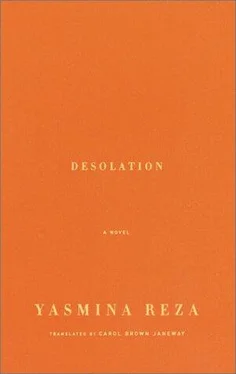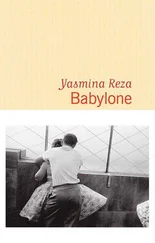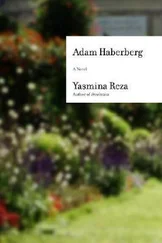In the refreshment bar where we find a seat, Genevieve doesn’t talk to me about her balcony, she talks about Leo Fench. “One day I got this note from Leo, and I’ll tell you right away it’s a quote from Louis Aragon which he’d picked up from who knows where because you know, Leo really didn’t read much at all (he said he’d read the essentials long ago); on this piece of typing paper, folded in four, he’d written, Don’t read this letter: read the other one, the one I tore up. Think about the fact that I’m constantly tearing up a letter, a sort of letter. . Followed by the name of the poet and nothing else. This other letter, my dear, gave me my reason to live for years. And even at this age, taking my grandson to his judo classes or pruning my roses with the wrong pair of clippers, I find myself wanting to decipher words that were never written, never given expression, and never heard. Leo didn’t want any part of a romantic entanglement. Love didn’t feature anywhere in Leo’s rules of life, if I can put it that way. It took me a very, very long time to believe that he could have any genuine feeling for me. You know, one never trusts the words of a seducer. The seducer cannot summon what might be called the moral element in language. In the same way one doesn’t dare give way to desire, because yes it’s idiotic but one is afraid of not being satisfied sexually (please excuse,” she adds, “this excessively confidential conversation which has overtaken me all of a sudden, it’s so rare to meet someone with whom I can talk about Leopold and all these things). There are women who boast that they know to keep a man that way. For me, on the other hand, it always made me very vulnerable. In the arms of a man with the reputation of knowing women, one thinks one will be a disappointment or uninteresting. I never imagined I had the slightest sway of that kind over him. Even in our most audacious moments I didn’t think I measured up to a Leo Fench, and perhaps this insecurity heightened the excitement. Leo died of a stroke at the age of fiftyseven. A man who had no intention of checking out so soon, who believed even more idiotically than most men in his own longevity. I don’t want to brush against you, I told him, I don’t want to be a walker through time who brushes against you as our paths cross. But Leopold embraced you even as he vanished into the mosaic of his life. Business, appointments, obligations on the rue Las-Cases, comings and goings of children, his inevitable other women (Leo operated on the principle that a man should seize upon all available women and that all women were more or less available, Leo liked quick sex, no sentiment, no tomorrows) whom I could never think about without feeling faint, trips, vacations, the endless absences that would wound your heart forever. Leo believed, and I still bear him a grudge for this, that we were imperishable. ”
Does it ever happen, my child, in your life of bliss, that you feel the stab of incurable loneliness? In the midst of the gardens in the park at Longchamp, under the deadly spring sun, a woman with whom you have everything in common says something and the words seem to trace a crack and you know there will be no coming together, that it’s hopeless, that the soul is solitary and there is nothing one person can do for the other.
She says, “Make me stop. Tell me about your trees, tell me about you, and your life, what are your children doing?”
“My daughter married a pharmacist and I’m a grandfather.”
Incongruous phrase which slips out for no reason, but for a moment, in the company of this disarming woman, I give way to spontaneous sentimental vaporings and even produce the name Jerome without having to search my memory.
“And your son?”
“My son loves life and the world,” I say.
“What luck!” she laughs. A Genevieve Abramowitz was what I needed. “And you?”
“Me, I’ve destroyed the best part of myself. I’ve become more human, and it’s tragic, Genevieve.” Upon which, I invite her to dinner that night.
We meet up at eight o’clock in the Ballon des Ternes. She’s wearing a green suit that matches her eyes, she’s discreet, she’s pretty, and I’m all dressed up as well. The table I reserved isn’t ready, so we have a drink at the bar. I order a whisky, an unusual order for me as you know since I only drink wine, Genevieve orders a gin and tonic. We’re both of us, for whatever reason, tongue-tied. I compliment her on the way she looks. She says I’ve remained a very attractive man. I say I didn’t know I ever had been. She tells me to stop flirting. I’ve honestly never thought of myself as well endowed by nature in that way, and certainly not these days when I’m going to pieces in all directions, but finally all it takes is the littlest thing and you’re in the sack. She wets her lips with the gin, I shake my glass to make the ice cubes clink. We smile at each other. The content of this evening is not yet clear. A waiter sets a saucer of shelled pistachios on the counter. “Do you still see Lionel?” she asks. Shelled pistachios, wonderful, I think to myself. “Still. And you?” I take a handful and pop them in my mouth. I’ll never know what Genevieve’s answer was because my teeth, all set to encounter something with the gentle bite of almonds, have just met an unexpected resistance that is completely and instantaneously disorientating. Simultaneously a glance at the saucer confirms the ghastly truth. I’m in the process of crunching spat-out olive pits.
It’s not true, I think, it can’t be true. I make a face and spit everything back into the saucer, I take a gulp of whisky — there was foresight in that order — and gargle it noisily, then another gulp, and another, seized with the uncontrollable need to disinfect myself. Genevieve, who hasn’t been following all this, stares at me dumbstruck. Between two doses of mouthwash and grimaces of disgust, I point to the saucer and the pits. “My poor friend,” she cries, helpless with laughter. “That’s horrible.” As I glance out of the corner of my eye at the scary clientele of this place, fat sauerkraut-eaters and beer guzzlers, provincial wrecks with grease-smeared mouths, i.e., the assembled pitspitters, it’s her laugh once again that delivers both me and our dinner from everyday wretchedness and its ordinary slot in time.
“I would never have thought,” she says once we’ve been seated at our table, “I would never have thought you’d be the kind of man who’d shut himself off in a house. Let alone the kind of man who’d take up gardening.”
“Nancy, my second wife, inherited a house in the Marne from her father. We used to go there from time to time. There are a lot of woods in the area. I like woods. On my side of the family we never had a particular place, I didn’t know what it was to become attached to a landscape by habit, walking through familiar trees, walking the same ground, the only variation being a little more to the right or to the left, or taking the longer way round or the shorter. I liked going back there. One day I bought a weeping willow at a tree nursery, then some privet that I planted in the garden every which way. I didn’t want to learn, I wanted to create. I dug little holes when what was needed was a hole ten times the size of the root ball, I went mad for manure, things to amend the soil, peat, I spread three bags of manure where one was required, telling myself it was better, I bungled around, I burned everything, but life had substance.”
“And rue Ampère?”
“I’m still there. A few days a week.”
I tell her I’m still there a few days a week and for the second time that day I feel the black wing of desolation unfurl and settle over me. Is it alcohol that makes the phrase so painful? A few days a week, and for how long? Am I shut off from the future forever? How did it happen? I hate the days. Where are the days, the real days? Stagnation is killing me.
Читать дальше












